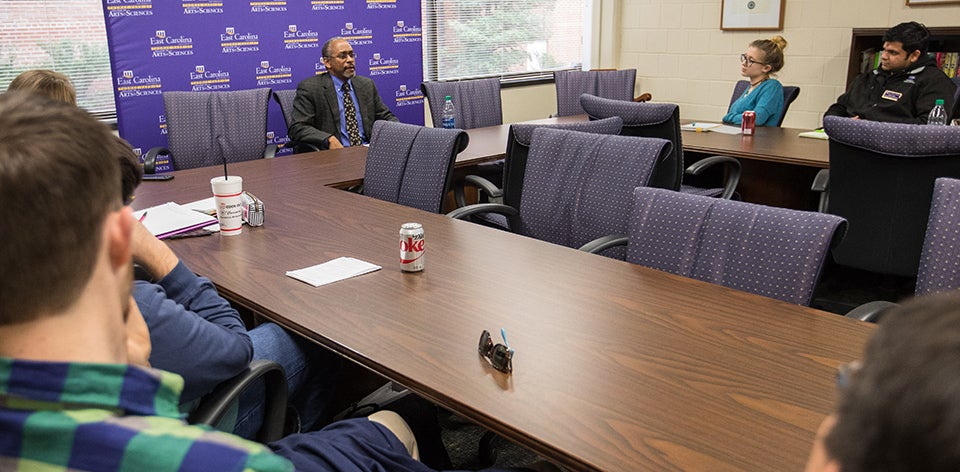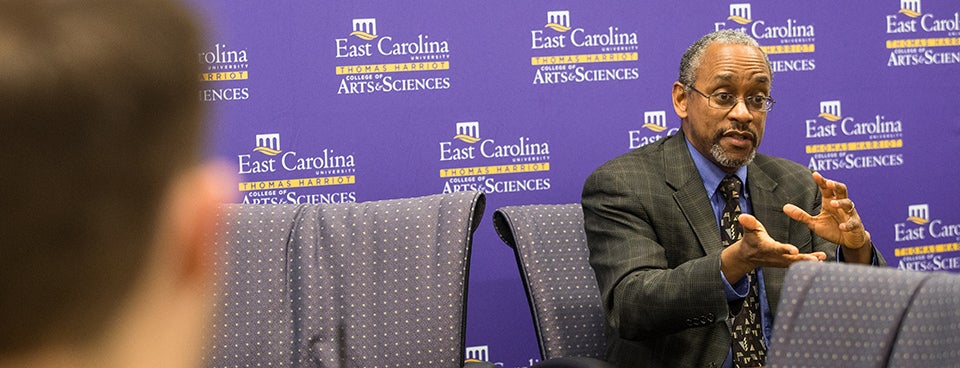VOYAGES OF DISCOVERY
Dr. Keith Wailoo discusses the intersection of pain and politics
There is a direct correlation between politics and the treatment of pain, according to Dr. Keith Wailoo, who spoke at East Carolina University on Jan. 31.
Wailoo, a Princeton University professor, was the guest lecturer for the 2016-17 Thomas Harriot College of Arts and Sciences Voyages of Discovery Lecture Series.
The debate over whose pain is real and who deserves relief is greatly influenced by ideological divisions in culture, politics and the courts, Wailoo said. His lecture covered a 70-year span of the history of politics, judicial decisions and how pain is perceived and treated in America.
“It is more than a question of whether or not pain is real,” said Wailoo. “It’s about who we believe deserves treatment.”
Described as a pendulum effect, the perception and treatment of pain since the 1970s directly correlates to the political ideology of a given time, Wailoo said. Because federal and state funding is given to those with disabilities, the question of who to treat and how to treat pain has become an increasingly economic and political discussion.
Wailoo argued that pain is also treated differently across racial and ethnic lines. Because pain may be perceived differently amongst groups of people, doctors may be under-treating patients based on their race or ethnicity.
“Initially, doctors wanted to validate the experience of pain and later attempted to find multi-faceted treatment options. But as more people applied for disability benefits with chronic pain as their main symptom, the debate began to shift,” said Wailoo. “The question now is how to manage pain in a cost-effective manner without over-prescribing or contributing to addictions.”
In 2011, the National Academy of Medicine issued a report called “Relieving Pain in America,” which emphasized “the need for a cultural transformation in the way pain is viewed and treated.”
At the end of the lecture, Wailoo said that one goal of his book and ECU lecture is “to shine a light on this vexing problem and move us down the road toward that cultural transformation in relieving pain.”
Dr. Marianne Montgomery, chair of the English department at ECU, who attended the lecture, said Wailoo “drew intriguing connections between the understanding and treatment of pain and social and political change, opening my eyes to the ways in which our attitudes towards pain are deeply enmeshed in politics, culture and geography.”
Also in attendance was chemistry department chair Dr. Andrew Morehead. “This lecture built on the previous two lectures in this year’s Voyage of Discovery series as all provided insight into the complexity and challenges of today and how we need to utilize every tool we have to respond,” he said.
Wailoo is the Townsend Martin Professor of History and Public Affairs at Princeton University, where he teaches in the Department of History and the Woodrow Wilson School of Public and International Affairs.
The former vice dean of the Woodrow Wilson school, Wailoo is an award-winning author on drugs and drug policy; race, science and health; history of medicine; and health policy and medical affairs in the U.S. Currently, he is working on two book-length projects that intersect with history and public policy: a study of the menthol cigarette and a history of addiction.
Prior to the evening lecture, Wailoo met with a group of graduate and undergraduate students from the Thomas Harriot College. The group discussed prohibition, the current opioid crisis and the political influences behind each.
For additional information about the Voyages series and upcoming speakers, visitwww.ecu.edu/voyages.

ECU graduate and undergraduate students from the Thomas Harriot College of Arts and Sciences discussed prohibition, the current opioid crisis and the political influences behind each with Dr. Keith Wailoo, the guest presenter for the Voyages of Discovery Lecture Series.
